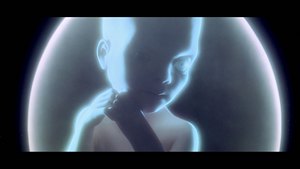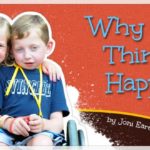Has Speculative Fiction Aborted Controversial Positions?
When it comes to social issues, there are few that generate as much heat and controversy as abortion. It seems the more controversial a topic is, the more likely someone who disagrees with your position will feel like you are preaching at them.
Case in point. I wrote a flash fiction one time that ended up having an abortion message. They discovered a gas they had collected were the unformed babies of an alien race. The captain realized they were about to kill the equivalent of embryos for that race. In this world, their history saw abortion in retrospect like we currently do slavery now: an evil culturally permitted but now seen for what it is. I had an overt statement to that reality in that fictional future.
The first place I submitted it to rejected it, in part because, as one editor put it, he felt like he’d been hit over the head with a hammer, and the whole story seemed to be a set up for saying abortion was wrong. I could see their point. I wondered, however, how much of that rejection was because they disagreed with the message, or how much was uncomfortableness in running something that controversial, or they just didn’t like the preachiness of it? Or a combination of the above?
I made the story more subtle by taking out the overt statement, and the next magazine took it. It is still online, titled Life Intruders.
But the experience illustrated how skittish some venues can be on appearing to take sides on an issue.
So I did an internet search on “speculative fiction abortion” and pulled up some examples.
One that popped up was an article on this site, by Rebecca LuElla Miller, in May of last year: Speculative Fiction and Our Culture. She highlights a book by Karen Hancock: The Enclave. In her review of the book, she says:
It is this aspect of speculative fiction—the ability to look at the hard issues, the complex topics—that I think too many people overlook . . .
In Russia, a movie gained blockbuster status with an abortion message, titled Nochnoi Dozor (Night Watch) back around 2003-04. The abortion message was a subplot. It worked in Russia. Not sure if the American version kept that subplot and if so, how well it did here.
In 2005, Jeff J. Koloze wrote an article titled “Twentieth-Century Science Fiction Literature and the Right to Life Issues of Abortion, Infanticide, and Euthanasia” In it, he lists five novels that significantly touch on abortion: H. G. Wells’ When the Sleeper Wakes (1899), Aldous Huxley’s Brave New World (1932), James Blish’s A Case of Conscience (1958), William F. Nolan and George Clayton Johnson’s Logan’s Run (1967), and Lois Lowry’s The Giver (1993).
However, he admits, “Abortion as a topic seems to be rarely mentioned in science fiction literature.” These five represent a tiny fraction of all the science fiction written last century, which would seem to support the premise that publishers and author fear aliening readers by appearing to have taken a side on a controversial topic like abortion. Much easier to avoid the issue.
One other example of note I found. Dave Astor, in writing about Margaret Atwood’s legacy at the Huffington Post, makes the following point:
Like Barbara Kingsolver, Atwood is socially conscious without being preachy. This is certainly the case in The Handmaid’s Tale, Oryx and Crake, and 2009’s The Year of the Flood — three dystopian novels that say a lot about things like women’s rights and the despoiling of the environment but do that via the books’ interesting characters and plots.
What do you think?
Why aren’t more novels themed on controversial topics like abortion? Are you likely to read an engaging story promoting a view other than your own on such a topic, or would you promise to never read another of his/her books? Is there not more because authors and publishers are afraid to risk losing readers? Or do readers of speculative fiction tend to not buy such books? Would you like to see more speculative fiction, by a Christian or not, address the subject in an engaging, but not preachy manner?











































I do have a book that I hope to get out before 2016. It’s called, Heaven’s Prodigal which deals with a future where abortion has evolved and base much of that on reading about what goes on inside abortion clinics. It’s a story of very mentally disturbed people with darkly comic and even some elements and a solid story behind it.
I would say there are two reasons that abortion stuff doesn’t sell or isn’t published. People read fiction primarily to be entertained and abortion isn’t very entertaining. So it’s problematic for the publishers and risky to do something on the topic.
Secondly, I think much fiction that has the purpose of communicating a message fails to tell a good story or have convincing characters. This was a problem I encountered with Childless which dealt with that issue but had so many glaring errors as a novel.
There have been some SF stories about abortion in the past, although they were controversial within fandom and among the pros.
Phillip K. Dick, whose religious views veered towards Christianity but were inarguably unique, wrote “The Pre-Persons” after Roe v. Wade, which he detested, and was verbally attacked by Joanna Russ for it.
Catholic author Tim Powers wrote “The Way Down the Hill” as an anti-abortion statement (in the December 82 issue of F&SF) – it’s available in his collection STRANGE ITINERARIES. His story “Night Moves” also presents abortion as the killing of an innocent person.
Walter M. Miller, another Catholic, expressed arguments against abortion and euthanasia in “Conditionally Human” in the 1950s, as well as his best-known work, “A Canticle for Leibowitz.”
Outside of traditional Christianity, Orson Scott Card has written at least one anti-abortion story (the titles escape me.) Harlan Ellison, who identifies himself as a politically progressive atheist, wrote a short story that at least expressed some ambivalence about abortion as an issue of personal responsibility in “Croatoan.”
It’s interesting that a few atheists have also opposed abortion – Christopher Hitchens, of all people, was anti-abortion, and George Orwell wrote an entire novel (non-SF) with an anti-abortion, pro-life theme (KEEP THE ASPIDISTRA FLYING).
Frank Peretti dealt with abortion too, as I recall, in one of his post-Darkness novels, Prophet. It wasn’t the main theme, but I believe it was quite blatant.
Becky
He also did so in a radio play turned novella called Tilly, which was blatant to the point of propaganda.
Soon I’ll be re-reading Prophet; lately I’ve been on a Peretti re-marathon.
In a later interview with Gene Veith at World magazine, Peretti said he wished the novel had stayed more on-focus with its theme of Truth versus media packaging. His goal was just what Becky said: to make abortion a secondary theme. He later said that he felt the abortion issue took over the story. I don’t see it that way. But I imagine readers did.
I wonder if such subjects work best in a subplot? Otherwise I guess it would be a temptation for the author to overdo it, because that’s what the book’s about.
Or something like abortion could perhaps be a small element of a much larger theme – such as what it means to be human, or human rights. Then the subject would not be treated in isolation, but as part of a bigger picture (which it is anyway), and people would be made to think more.
A story I wrote on abortion got an honorable mention at Writer’s of the Future last year (called Firstborn and available over at Amazon). A young woman on a generational ship has to make a tough choice.
I think it’s just you gotta tell a good story. OSC played a very long game in Enders with Ender being a “third”. I thought, great here comes more SF malthusianism till he turned it around so that by the end of the Bean stories, the reader is totally put off by the policy. He doesn’t do it directly. He shows how the policy affects the characters, and those critical of the policy are the characters the reader most empathizes with. It’s very clever what he did.
Oddly enough, the example of pro-life issues in fiction that comes to mind is fantasy, and animal fantasy at that. The first book of the Mistmantle Chronicles has a program of government-enforced infanticide for weak infants, with the possible introduction of euthanasia for the old (referred to as “culling” in both cases).
Interesting examples. I knew our readers would come up with more.
Do you think there should be more such stories, or is it beating a dead horse?
I ended up deciding that I couldn’t keep on arguing in the last comments-discussion on this topic because I was getting too upset. I might have to do the same thing here, but I wanted to offer at least one comment.
I did see Nightwatch, and also Daywatch, and I would offer a different interpretation than just straight pro-life. Whatshisname, Anton, could have just left his wife without trying to get some kind of revenge. He didn’t seem to care about staying with her, and the kid would have had no bearing on his life as it did in Universe Reset Ending and, really, the “first” life until it turned out the kid was Mystic Jesus Figure (uh, spoilers? though it’s not that much of a spoiler). To me, that’s different than if the wife decided she didn’t want to carry the pregnancy for whatever physical, emotional, or financial reason. The kid — even just as a potential kid — is unambiguously and inescapably affecting her.
Problem is that if a Christian writes on abortion it’s not going to be controversial; they’ll more often than not just write a polemic illustrating the arguments almost all Christians hold. You can do this poorly or well, but it’s really not going to have the speculation or storytelling needed to make it work.
Not sure why a Christian writing it would be any less controversial than not. If you’re talking about writing to the Christian market (CBA), that would be more true, but there are plenty of liberal/progressive Christians who are not pro-life. What percentage of those make up the CBA market, I don’t know, but would imagine it less than the general market. But they are there.
So if an Amish romance book hit on the subject in a decidedly pro-life take, are their Christian publishers who would/have published that book?
Not sure I agree that it can’t work. True, many attempts fail, but I don’t buy that a Christian can’t weave such a theme into an engaging story effectively. But I think on more controversial topics like this, people who disagree strongly with the viewpoint of the story will feel “preached at” no matter how subtle it is done or how great the story and writing itself is. For those folk, avoiding the issue is the only option to not lose them as readers. True for Christian and general markets. That’s why for many, this one issue decides who they will vote for as president, whether for or against it. Same with books.
I meant the Christian markets; Christians in secular spec fic are so small a minority as not to be counted in most arguments here. A Christian can’t really write controversially over abortion because most of the people who would read his work would share the same values. No named Christian work would really challenge this. The people who would buy Amish books for the most part wouldn’t find a pro-life tint to be controversial. The people that would wouldn’t read Amish to begin with due to the other features of that genre.
While there are religious progressives, they tend to not bother with Christian fiction either writing or reading it.
“Battlestar Galactica” (the new one) had an abortion theme going for awhile, with an unborn baby who was half-cylon and half-human. There were vicious debates over the baby’s humanity, over whether they were justified in killing it because of that, whether abortion should be okay at all if there were very few humans living anymore, etc.
I think these kinds of themes are valuable and possible, but primarily as conversation-STARTERS, something to get the reader thinking, to prick the conscience. If the writer’s intention is to change people’s minds on the issue just by reading their book, I think they’re a little overambitious and likely to preach. Personally, being pro-life, if I read a book with a clear pro-abortion message in it, I do think I would avoid that author’s books afterward, because I’d find their agenda depressing and I wouldn’t want to support their continued efforts to deny the humanity of the unborn.
James Patterson tackled something similar in the first Maximum Ride book, Where the Wind Blows. Since the whole series is about experimentation on children/babies/fetuses, its shown for the horror that it is. But it’s also used to tell an entertaining story about kids with wings. 🙂
Heck, Doctor Who had a two-part episode in season 6 (I think) about doppelgängers, and it was the whole argument about whether or not the gangers were people. At one point they find a pile of discarded gangers all fused together, and the sound effects are of babies crying. It’s subtle, but very much addressing the morality of throwing away life for the sake of convenience.
Actually, the Maximum Ride in When the Wind Blows and the sequel The Lake House is a different character than the popular YA series. I’m not sure which came first, but I feel the two-book set is much more contemplative and mature than the YA series, which starts out with potential, and ends in love triangles, global warming preaching, and extremely implausible abilities to the point of Mary Sues.
The “point” of When the Wind Blows seems to be caution against transhumanism, not necessarily anti-abortion, though the fact that these experiments are carried out pre-birth could be interpreted as “unborn babies are human.”
Abortion can be tied into other social concerns, such as euthanasia, or even animal rights. In the Walter M. Miller story I referenced earlier (Conditionally Human), the protagonist is something much like a dogcatcher in a future society which coped with overpopulation by restricting births only to those with superior genetic potential. The drive to have children in those with less than stellar genes is achieved through animals (dogs, cats, and chimpanzees) which have been genetically engineered to approximate a toddler’s level of speech and intelligence, and which are delivered to the mother in a “birthing” ritual that copies childbirth. The protagonist’s job is to collect and destroy any animals that escape, have outlived their short lifespan, or who show signs of advanced traits. When a greedy genetic engineer creates a line of chimps that show advanced consciousness, the animal catcher is tasked with seizing and destroying them all and seizes one that is capable of human interaction and self-awareness (about like a 6 year old) from a pet store owner who loves her like a daughter . There is an interesting confrontation between the protagonist and a priest (the brother-in-law of the pet store owner) who has come to plead with him not to destroy the chimp, who is also bonding increasingly with the animal catcher’s wife. When the animal catcher tells him that the priest’s Church doesn’t believe that animal souls are of the same worth as a human soul, the priest argues that it may not be, but we shouldn’t risk destroying it, for the same reason one does not shoot into an empty house if one is not sure there is no one inside. This is the same argument that is often advanced against abortion, and it’s interesting that Miller was advancing it back in 1954. It’s a very disturbing story that makes one reconsider one’s views, whether one loves animals and/or babies.
Heinlein’s “Joe Was a Man” explored similar moral territory, but I think Miller’s carried a greater punch.